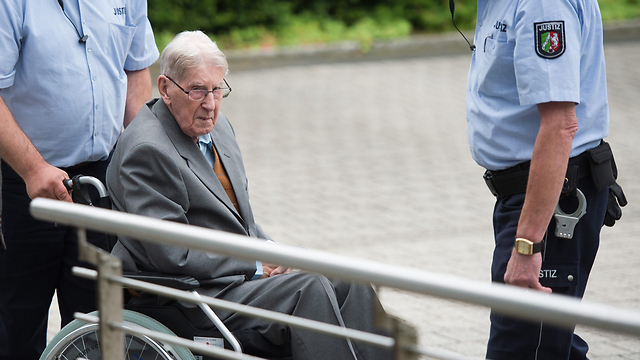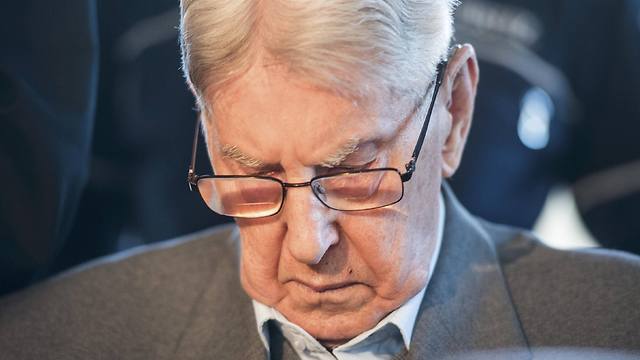
Hanning
צילום: EPA
Court convicts Auschwitz guard, 94, of accessory to murder
In what is assuredly one of the final trials for Nazis, Reinhold Hanning has been found guilty of more than 170,000 counts of accessory to murder for his Auschwitz service from 1942 to 1944; the Nazi was tried not for his specific actions, but rather for his having contributed to the functioning of the camp.
DETMOLD, Germany - A 94-year-old former SS sergeant who served as a guard at Auschwitz has been found guilty of more than 170,000 counts of accessory to murder for helping kill 1.1 million Jews and others at the Nazi death camp.
The Detmold state court sentenced Reinhold Hanning to five years in prison, though he will remain free while any appeals are heard.
During his four-month trial, Hanning admitted serving as an Auschwitz guard. He said he was ashamed that he was aware Jews were being killed but did nothing to try to stop it. He had faced a maximum of 15 years.
"It disturbs me deeply that I was part of such a criminal organization," he told the court in April. "I am ashamed that I saw injustice and never did anything about it and I apologize for my actions."
Despite his age, Hanning has seemed alert during the four-month trial, paying attention to testimony and occasionally walking in to the courtroom on his own, though usually using a wheelchair.
Several equally elderly Auschwitz survivors testified at the trial about their own experiences, and were among about 40 survivors or their families who joined the process as co-plaintiffs as allowed under German law. Leon Schwarzbaum, a 95-year-old Auschwitz survivor from Berlin who was used as slave laborer to help build a factory for Siemens outside the camp, told the court at the start of the trial that he regularly saw flames belching from the chimneys of the Auschwitz crematoria.
"So much fire came out of the chimneys, no smoke, just fire," he told the court. "And that was burning people." Schwarzbaum later said he does not want Hanning to go to prison and is happy that he apologized, but had hoped that he would have provided more details about his time in Auschwitz for the sake of educating younger generations. "The historical truth is important," Schwarzbaum said.
Hanning joined the Hitler Youth with his class in 1935 at age 13, then volunteered at 18 for the Waffen SS in 1940 at the urging of his stepmother. He fought in several battles in World War II before being hit by grenade splinters in his head and leg during close combat in Kiev in 1941.
He told the court that as he was recovering from his wounds he asked to be sent back but his commander decided he was no longer fit for front-line duty, and so sent him to Auschwitz, without his knowing what it was.
Though there is no evidence Hanning was responsible for a specific crime, he was tried under new legal reasoning that as a guard he helped the death camp operate and thus could be tried for accessory to murder. Though the indictment against Hanning is focused on a period between January 1943 and June 1944 for legal reasons, the court has said it would consider the full time he served there.
The same argumentation being used in Hanning's case was used successfully last year against SS sergeant Oskar Groening, to convict him of 300,000 counts of accessory to murder for serving in Auschwitz. Germany's highest appeals court is expected to rule on the validity of the Groening verdict sometime this summer.
Groening, 95, was sentenced to four years in prison but will remain free while his case goes through the lengthy appeals process and is unlikely to spend any time behind bars, given his age.
In Hanning's case, prosecutor Andreas Brendel recommended six years in prison while his defense attorneys argued for an acquittal, rejecting the new legal reasoning.
The precedent for both the Groening and Hanning cases was set in 2011, with the conviction in Munich of former Ohio autoworker John Demjanjuk on allegations he served as a Sobibor death camp guard. Although Demjanjuk always denied serving at the death camp and died before his appeal could be heard, it opened a wave of new investigations by the special prosecutor's office in Ludwigsburg responsible for Nazi war crime probes.
The head of the office, Jens Rommel, said two other Auschwitz cases from that renewed effort are still pending trial -- another guard and also the commandant's radio operator, contingent on the defendants' health, which is currently being assessed -- and a third is still being investigated by Frankfurt prosecutors.
Rommel's office, which has no power to bring charges itself, has also recommended charges in three Majdanek death camp cases, and has sent them on to prosecutors who are now investigating.
Meantime, the office is still poring through documents for both death camps, and is also looking into former members of the so-called Einsatzgruppen mobile death squads, and guards at several concentration camps.
Rommel said even though every trial is widely dubbed "the last" by the media, his office still plans on giving more cases to prosecutors and politicians have pledged to keep his office open until 2025.
"That seems to me to be the outside boundary," said Rommel, who's not related to the famous German general of the same surname. "If the cases will make it to trial, that's hard to say. You can't really look into the future—but we have the mandate to keep investigating as long as there's still the possibility of finding someone."













